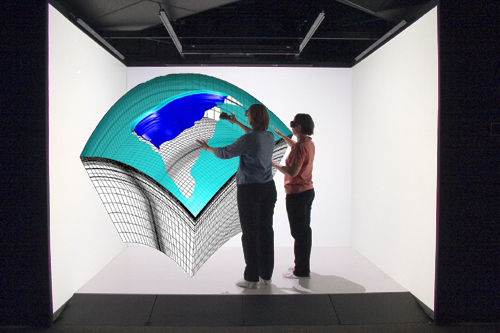Award Abstract #1135588
![]() CI-TEAM Impl: Dynamic Interdisciplinary Research Environment to Engage and Develop a Cyber-Ready Workforce in the Geosciences, Social Sciences, and Computer Sciences
CI-TEAM Impl: Dynamic Interdisciplinary Research Environment to Engage and Develop a Cyber-Ready Workforce in the Geosciences, Social Sciences, and Computer Sciences
![]()
| NSF Org: | OCI Office of CyberInfrastructure |
| Initial Amendment Date: | August 8, 2011 |
| Latest Amendment Date: | August 18, 2011 |
| Award Number: | 1135588 |
| Award Instrument: | Continuing grant |
| Program Manager: | Mark Suchman OCI Office of CyberInfrastructure O/D OFFICE OF THE DIRECTOR |
| Start Date: | December 1, 2011 |
| Expires: | November 30, 2014 (Estimated) |
| Awarded Amount to Date: | $949992 |
| Investigator(s): | Louise Kellogg kellogg@ucdavis.edu (Principal Investigator) Bernd Hamann (Co-Principal Investigator) Joseph Dumit (Co-Principal Investigator) Dawn Sumner (Co-Principal Investigator) Eric Cowgill (Co-Principal Investigator) |
| Sponsor: | University of California-Davis OR/Sponsored Programs Davis, CA 95618 530/754-7700 |
| NSF Program(s): | DEEP EARTH PROCESSES SECTION, CI-TEAM, GEOPHYSICS, ADVANCES IN BIO INFORMATICS |
| Field Application(s): | |
| Program Reference Code(s): | 7571, 7477, 1574, 1165 |
| Program Element Code(s): | 7571, 7477, 1574, 1165 |
ABSTRACT
![]()
This CI-TEAM Implementation Project is developing an interdisciplinary research environment for preparing a cyber-enabled workforce in the geosciences, computer science, science and technology studies, anthropology, and physics. The project engages students in interdisciplinary teams to jointly develop, use, and disseminate cyber-infrastructure (CI) tools and techniques using virtual reality (VR) and scientific visualization for research and education across three interdisciplinary themes. The project builds on knowledge and experience that the team has gained over six years of interdisciplinary collaboration at the Keck Center for Active Visualization in the Earth Sciences (KeckCAVES). KeckCAVES provides both a fertile environment for interdisciplinary research and uniquely interactive, immersive virtual reality environments that allow users to visualize and analyze large and complex datasets.
Intellectual Merit: The proposed project enables both students and more advanced researchers to contribute to the frontiers of knowledge in geosciences, computer science, anthropology, humanities, and physical sciences through the use of VR. It extends the technological and scientific frontiers in three new, innovative, yet intersecting directions:
– Remote collaboration via tele-immersion: Teams are developing innovative methods of tele-immersion technology to enable remote interaction between teams of people at different locations with datasets, to facilitate research and teaching collaboration. In the process of this development, students are gaining knowledge and insight into the behavior of VR and immersive visualization.
– Rapid Scientific Response (RSR) to natural disasters: Teams are developing CI capacity for rapidly collecting, visualizing, and interpreting data collected after major geologic events. This capacity will contribute to our knowledge of the geologic processes driving earthquakes, volcanoes, landslides and other catastrophic events.
– 3d Compare: Teams are developing the capacity to manipulate and quantitatively compare digitally represented objects using interactive CI methods for use in diverse applications including 3D digital scans of buildings, cultural heritage sites, and archeological, geological, and paleontological samples.
Broader Impacts: This CI-TEAM project contributes to the development of a diverse, cyber-enabled workforce by engaging undergraduates and graduate students in the use of virtual-reality-based technology for discovery-based scientific research. The team is engaging students and postdocs across disciplines to co-develop CI tools for their own research and that of their peers, and to develop a cohort of cyber-enabled scientists and software developers with experience working on interdisciplinary teams. Participants in this project will have the opportunity to participate in collaborations with US and international partner institutions.
They are developing with students and postdocs, innovative, high-quality learning technologies and instructional materials that are broadly adoptable by multiple disciplines and institutions. They will disseminate these technologies and methods by providing software under the GNU General Public License; disseminating software tools and documentation, and publishing educational modules, documentation, and research and educational outcomes to facilitate the use of the tools. They will provide visualization experiences to established, effective STEM outreach programs that effectively target K-12 students.
The CI tools developed in this program will enable research and teaching advances in three critical areas: study of virtual objects, remote collaboration between various groups and agencies, and rapid scientific response to natural disasters. The development of these technologies could become vitally important in assisting multinational agencies to make sound decisions based on complex data.
